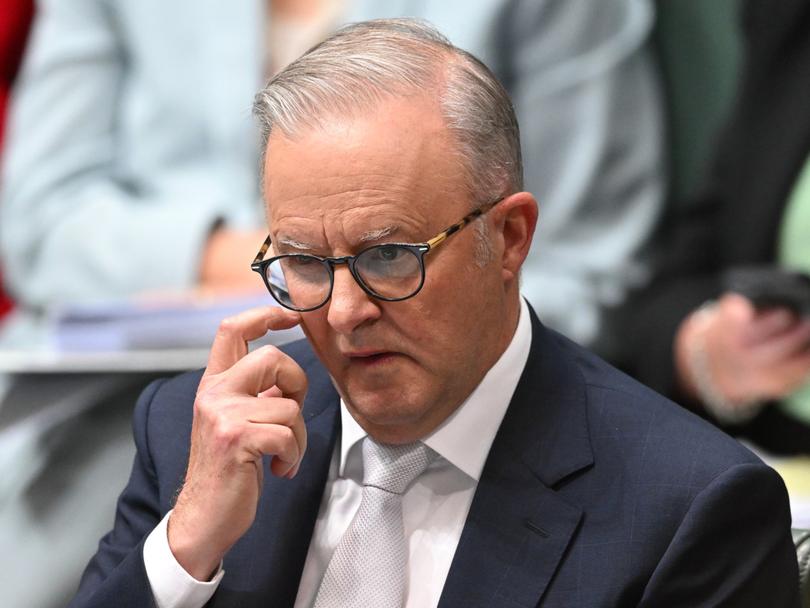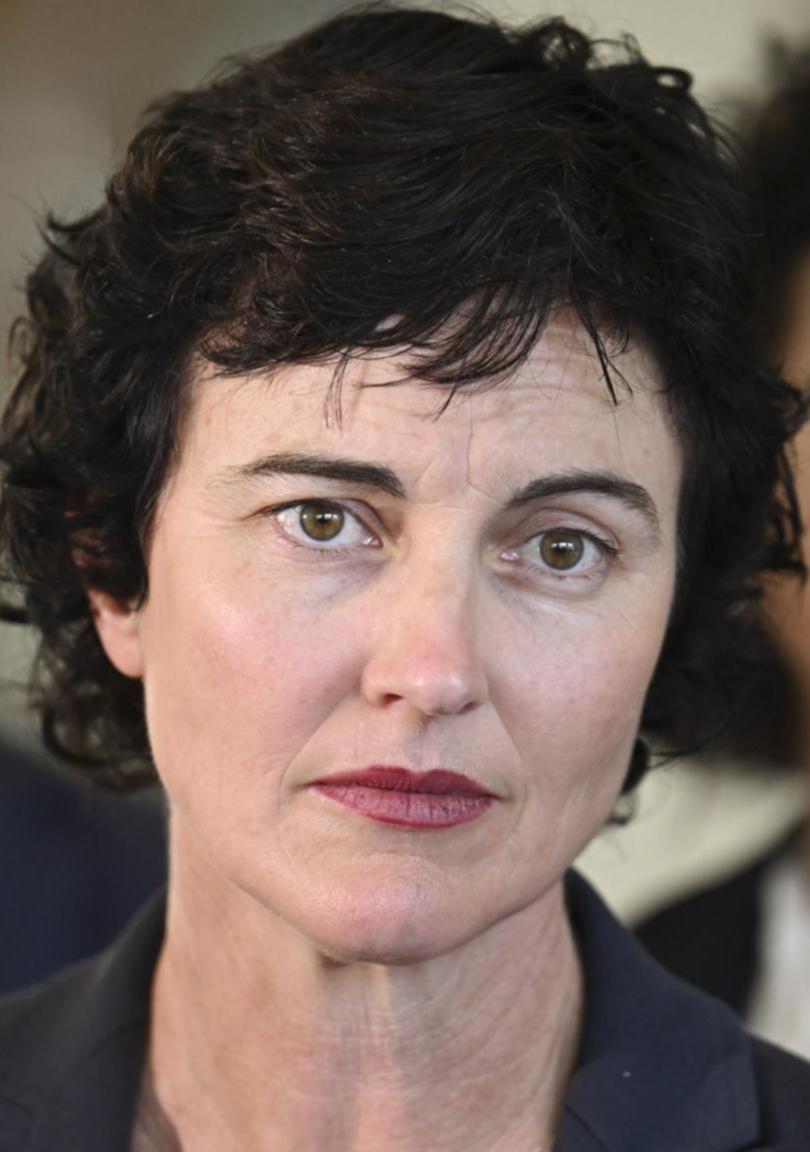PAUL MURRAY: It will take a minor miracle in the Federal election to avoid major problems
PAUL MURRAY: Independents are likely to hold sway at the Federal election and Labor has no shame in who it courts as it tries desperately to cling on to power.

The decline in the primary vote of Australia’s two major political parties has thrown the focus back on the diaspora of pretenders who might end up deciding which forms the next minority national government.
For anyone really interested in the need for political stability and policy certainty to progress Australia’s economic and social ambitions, it’s a scary prospect.
And yes, the ability to provide a prosperous economy will always be more important in selecting a government than any voter’s desire to express ideological virtue over fringe issues.
Sign up to The Nightly's newsletters.
Get the first look at the digital newspaper, curated daily stories and breaking headlines delivered to your inbox.
By continuing you agree to our Terms and Privacy Policy.For example, is a vote for Legalise Cannabis or the Animal Justice Party or a blowhard like Jacquie Lambie — who entered the national parliament on the opportunistic coat-tails of Clive Palmer — ever going to help form a sound government?
For those Australians who are pissed off enough with Labor and the Coalition parties to place their vote with a candidate they know will never get elected — or if they are, who will never be in government — their ballot carries all the intellectual weight of a choice between McDonald’s and Hungry Jacks.
The gradual rejection of the major parties which formed stable governments for more than 100 years in arguably the most successful representative democracy on the planet seems to be principally fuelled by indifference.
Rather than getting involved in fixing the issues that bother them about the major political parties, Australians increasingly prefer to swipe left. How very modern.
Our former national characteristic of “she’ll be right” has morphed into “someone else’s problem”. In the social media world, it’s far easier to unlike something than to make it better.
Swept along on this unrest, Anthony Albanese’s incompetence and unpopularity has now reduced Labor federally to the prospect of, at best, a slim minority government at the mercy of the Greens and teal independents.
How Labor could continue to countenance preference swaps with the Greens — or, even worse, a Gillard-style deal to jointly govern with them — given their role in the recent rise of anti-Semitism, is sickening. More on that later, but Albanese needs to match his anti-Greens rhetoric with some principled action.
If Labor can’t achieve a Greens-supported government, the trend in opinion polling suggests we could get a Coalition administration dependent on a few grudgingly supportive cross-benchers.
In both scenarios, the lack of primary support for the two major parties would produce compromised governments ultimately constrained in fulfilling the promises that got them elected, further inflaming voter discontent.

That is how perverse our national politics has become.
This time around, those voters intending to shun the major parties to support an independent in such a tight election might end up with a bad case of buyers’ remorse.
And as the bookies confer favouritism on Peter Dutton forming a minority government, those voters who elected teal independents in previously Liberal seats have some soul-searching to do.
What do independent MPs really achieve? The reality is not much unless they end up in the balance of power.
And then, what they are able to leverage from their support is essentially undemocratic because they get more than their vote is genuinely worth.
How does that fit with the “integrity” virtue-signalling that drove the teals’ vote in 2022? Such horse-trading is always potentially corrupt.
Democracy works on the simple basis that everyone’s vote is equal. In the balance-of-power scenario, that becomes corrupted.
Parliament also works on the basis that each member’s vote is equal and the party or parties with the most votes in the lower house get to form government. But this is bent out of shape when a prospective government falls a few seats short of the required numbers.
That has the potential to confer unearned power on some MPs, who are not within the prospective governing party, if they chose to offer it their support.
Suddenly not all MPs’ parliamentary votes are equal either. Let the blackmail begin.
Democracy is corrupted when those fringe MPs, who would never be part of a government themselves, are able to dictate terms to a party with massively more support than them.
The government then becomes a hostage to an empowered minority which is able to have its demands met — in the interests of enabling their erstwhile opponents to slide into power — even though their policy demands don’t have wide support.
So the balance of power phenomenon creates the environment for corruption. The will of the majority is not properly expressed. In fact, the will of a small minority becomes dominant.
This is the fuse voters light when they support independents and minor parties, leading to a perversely undemocratic outcome.
Those Greens and teal MPs licking their lips at the prospect of happenstance putting them in the balance of power can only get that unearned leverage if enough voters avoid the major parties.
The balkanisation of our parliament can only create unstable hostage governments that are unable to fulfil their campaign promises because their captors with far less electoral support countermand them.
It is delusional to argue this makes for better government as the teals’ supporters attempt.
Dutton’s chance of forming government will ultimately depend on whether he can reclaim the seven seats won by teals, notably Curtin in WA, which is held on the slimmest majority of just 1.26 per cent.
From Chaney’s pronouncements, there appears little chance she would support a Dutton minority government, but every chance she would give Albanese a leg up in similar circumstances.

So a vote for Chaney in this looming, very tight Federal contest really would be a vote for Labor by denying Dutton a vital seat towards the 76 he needs for majority government. The Coalition currently has 55.
When Chaney announced her intention to stand again, she was strangely unable to detail her achievements in office.
Her statement said she was “elected to do politics differently, on a platform of climate action, political integrity, compassionate inclusion, and economic reform” and that she “has made good on that commitment, so far”.
On what metric? Or does she just serve to make some wealthy residents of Curtin feel better about themselves while advancing our national interest not one jot?
“Since the election, working collaboratively with a constructive crossbench, I have been instrumental in achieving shifts in government policy and legislation, as well as initiating national discussion on issues the major parties seek to avoid, such as tax reform, donation transparency, vehicle emissions standards, and gambling reform,” Chaney said.
“Shifts” in government policy? And where’s this “national discussion” on tax reform? Talk about nebulous.
However, Chaney’s statement made her antipathy to Dutton much clearer than her achievements.
“The Liberal Party lost Curtin — and similar seats — at the last election because our values weren’t being represented,” the former ALP member said. “And from what I’ve witnessed in my first two years, the party hasn’t changed under Peter Dutton’s leadership.
“In fact, it’s become more divisive and polarised, driven by fear and anger and devoid of genuine policy ideas or constructive engagement. Peter Dutton’s Liberal Party does not represent the values of Curtin.”
Curtin will, once again, be decided on preferences with Chaney likely to finish second on primaries behind the Liberals and dependent on Greens and Labor preferences to get her over the line.
In 2022, the Liberals polled 41.3 per cent of the primary vote, followed by Chaney (29.5), Labor (13.9) and Greens (10.4).
Chaney got 52.5 per cent of Greens preferences, Labor got 39.8, the Liberals just 7.6. Labor’s preferences in the final round of the count then went 76 per cent to Chaney, giving her a 2657 vote win.
If the anti-Morrison sentiments in 2022 represented a high-water mark in Curtin for the non-Liberal vote, Chaney will need to increase her primary number substantially because Labor and the Greens are unlikely to give her the same preferences uplift.
What we are already seeing in the State election race is that Labor is putting pragmatism ahead of principle in its preference choices, playing footsie with strange political bedfellows.
Labor’s Upper House how-to-vote-card gives its first preferences to Legalise Cannabis followed by the Greens and Animal Justice. These are the governing party’s chosen soulmates.
Does Legalise Cannabis as the first preference pick indicate Labor agrees with the party’s prime policy position? Labor’s platform is to “decriminalise” possession of small amounts of marijuana for personal use.
Is this choice an indication that it will legalise cannabis in its next term, a very different thing indeed? Labor needs to come clean.
And how can Labor in all conscience give its first preference to the Greens in lower house seats, ignoring the minor party’s MPs who have parlayed pro-Palestine policies into a tide of open anti-Semitism?
Does Labor these days stand for anything other than getting elected? Unless politics is backed by principle, it just becomes about hanging on to power.
